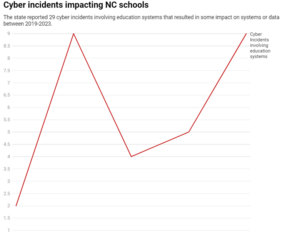North Carolina Schools Cyber Incidents Increase
Jeff Wolverton

As the school year comes to a close, many educational institutions are reflecting on the past year’s challenges and preparing for the next. One of the critical areas of focus is cybersecurity. The latest data reveals a significant trend: a rising number of cyber incidents impacting schools in North Carolina. Between 2019 and 2023, the state reported 29 cyber incidents involving education systems, highlighting an urgent need for enhanced security measures.

Graphic provided by ABC11
The Alarming Rise in Cyber Incidents
The data from 2019 to 2023 shows a fluctuating but concerning pattern in the frequency of cyber incidents affecting educational systems. In 2019, there were 2 reported incidents, but this number spiked dramatically to 9 incidents in 2020. The following year saw a decline, with incidents dropping to 3 in 2021, but the trend reversed again in 2022, climbing back to 4 incidents. By 2023, the number had risen sharply to 8 incidents, underscoring the persistent and evolving threat landscape that schools face.
The Impact on Education
Cyber incidents in schools can have far-reaching consequences, affecting not only the integrity and availability of educational data but also the overall learning environment. These incidents can disrupt classes, compromise sensitive student and staff information, and lead to significant financial and reputational damage. As schools increasingly rely on digital tools and online platforms for teaching and administration, the potential attack surface expands, making robust cybersecurity measures more critical than ever.
Proactive Measures for the Future
In response to these growing threats, schools across North Carolina and beyond are ramping up their cybersecurity efforts. Here are some key strategies being implemented:
- Enhanced Security Training: Schools are investing in cybersecurity training for staff and students to ensure they can recognize and respond to potential threats.
- Upgraded Technology: Many schools are upgrading their IT infrastructure, including installing advanced firewalls, antivirus software, and intrusion detection systems.
- Regular Audits and Assessments: Conducting regular security audits and vulnerability assessments helps schools identify and address potential weaknesses in their systems.
- Incident Response Plans: Developing and testing comprehensive incident response plans ensures that schools can quickly and effectively respond to cyber incidents when they occur.
- Collaboration with Experts: Schools are partnering with cybersecurity firms and experts to stay ahead of emerging threats and implement best practices.
The Role of PivIT Strategy
At PivIT Strategy, we understand the unique cybersecurity challenges that educational institutions face. Our team of experts is dedicated to helping schools develop and implement comprehensive cybersecurity strategies tailored to their specific needs. From risk assessments and security training to technology upgrades and incident response planning, we provide the support schools need to protect their digital environments and ensure a safe, uninterrupted learning experience.
Conclusion
As cyber threats continue to evolve, so must our defenses. By taking proactive steps to enhance cybersecurity, schools can better protect their systems, data, and communities. As we look ahead to the next school year, let’s prioritize cybersecurity to ensure a safe and secure educational environment for all.
For more information on how PivIT Strategy can help your school enhance its cybersecurity posture, contact us today.
Jeff Wolverton
Jeff, the CEO of PivIT Strategy, brings over 30 years of IT and cybersecurity experience to the company. He began his career as a programmer and worked his way up to the role of CIO at a Fortune 500 company before founding PivIT Strategy.
